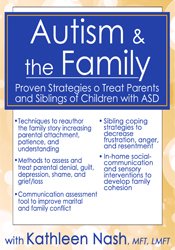Description
- Techniques to re-author the family story increasing parental attachment, patience and understanding
- Methods to assess and treat parental denial, guilt, depression, shame and grief/loss
- Communication assessment tool to improve marital and family conflict
- Sibling coping strategies to decrease frustration, anger and resentment
- In-home social-communication and sensory interventions to develop family cohesion
Are you able to fulfill the unique therapeutic needs of parents and siblings of children with an Autism Spectrum Disorder (ASD)? Their emotional journey may begin with feelings of denial and injustice, but quickly turns to feeling overwhelmed and fear that their family is falling apart.
Join autism expert, Kathleen Nash, MFT, LMFT, and learn creative and practical family therapy techniques and strategies to help:
- Parents identify and resolve feelings of denial, guilt, depression, shame and grief
- Increase parental attachment, patience and understanding
- Sibling/s overcome anger, shame, resentment and guilt
- Improve marital conflict and family functioning
- Parents find financial resources and support
Kathleen will give you ready-to-use intervention handouts and forms to assess presenting issues and create effective treatment goals to improve parental balance and communication, positive sibling interactions and inspire extended family support. Role plays based on actual clients and ‘self of the therapist’ activities are employed in this experiential seminar.
CPD
CPD
- PESI Australia, in collaboration with PESI in the USA, offers quality online continuing professional development events from the leaders in the field at a standard recognized by professional associations including psychology, social work, occupational therapy, alcohol and drug professionals, counselling and psychotherapy. On completion of the training, a Professional Development Certificate is issued after the individual has answered and submitted a quiz and course evaluation. This online program is worth 5.0 hours CPD for points calculation by your association.
Faculty
Kathleen Nash, MFT, LMFT, is an autism expert with over 10 years of clinical experience providing intensive in-home family therapy to parents and siblings of children with ASD. In her private practice, she continues to provide therapy to children with ASD and their families, as well as therapy to promote the mental health, social and emotional well-being of adolescents and their families, survivors of trauma and individuals with medical issues and their families. Kathleen is an adjunct professor and clinical supervisor in Drexel University’s Couple and Family Therapy Department. As a licensed marriage and family therapist in Pennsylvania, she has family case studies and many real life illustrations to share. Kathleen has led regional and national seminars on a variety of topics, including autism spectrum disorders, parenting teens and college students, balancing work/school and family, and team building. She is a Clinical Fellow of AAMFT and an AAMFT approved supervisor. Kathleen received her Master of Family Therapy degree from Drexel University and a Master of Science degree in Education from Bloomsburg University.
Speaker Disclosure:
Financial: Kathleen Nash maintains a private practice. She is an Adjunct Faculty member at Drexel University. Ms. Nash receives a speaking honorarium from PESI, Inc. She has no relevant financial relationships with ineligible organizations.
Non-financial: Kathleen Nash has no relevant non-financial relationship to disclose.
Objectives
- Employ the DSM-5® criteria to illustrate real life child and family members’ experiences that influence family cohesion, coping and emotional narratives.
- Recognize family members’ emotions, e.g., shame, guilt and resentment, and determine which interventions to use to improve family coping and cohesion.
- Design treatment plans using interventions to strengthen positive relationships between parents, siblings, extended family and school personnel.
- Identify sensory integration issues and employ individualized strategies that impact family inclusion, self-regulated behavior and emotional attachment.
- Recognize how “self of the therapist” ability and disability narratives impact therapeutic relationships.
- Demonstrate application of new interventions using an interactive case study and audio/visual demonstration.
Outline
Autism Spectrum Disorder (ASD)
- Linking DSM-5® diagnostic criteria to real life issues
- Behavioral issues and sensory integration
- The Gift of ASD
Marital Conflict Interventions
- Communication assessment tool to measure skills and needs
- Self-care techniques to manage stress and ` build resilience
- Calming strategies for distress, conflict and depression
- Identify stages of grief and loss through
- Contextual Family Therapy
- Financial resources and supports
Parental Attachment Interventions
- Tools to measure parent/child attachment
- Narrative Therapy to re-author the family story
- Motivational Interviewing to explore emotions
- Promote attachment and increase family functioning
- Decrease conflict, resentment and exasperation
Sibling Attachment Interventions
- First person stories to identify jealousy, confusion and resentment
- Scripts, letters and art activities to increase sibling attachment
- Age-appropriate strategies to address confusion and social isolation
Family Cohesion Interventions
- Communication - Increase expressive/ receptive and verbal/nonverbal skills
- Social Pragmatics – Develop social language skills, expressing emotions and social skills
- Sensory - Sensory Integration behavior checklist
- FAQ form to address denial, insensitivity and abandonment
- “Ask Cards” to request specific help from extended family members
Navigating IDEA, IEPs and Teachers
- Special needs acts and laws
- Effective IEP goals and accommodations
- Guidelines of parental rights and advocacy
- Strategies to help parents advocate for their child
- Handout of area special needs attorneys and advocates
‘Self of the Therapist’ Experiential Activities
- Personal beliefs about ability and disability
- Disability awareness group activity
Interactive Case Study Based On Real Life Families
- Video demonstration of ASD family therapy interventions
- Ready-to-use treatment planning form
Target Audience
Case Managers, Counselors, Marriage & Family Therapists, Occupational Therapists & Occupational Therapy Assistants, Psychologists, Social Workers, Speech-Language Pathologists and other Mental Health Professionals

